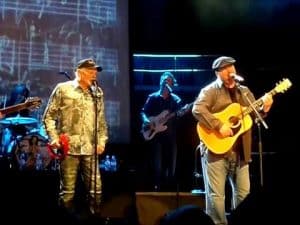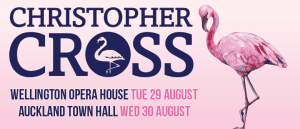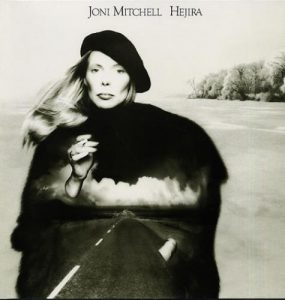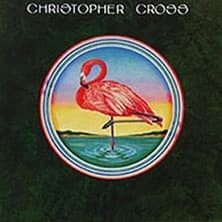Christopher Cross: The 13th Floor Interview
Christopher Cross arrives In New Zealand this week to perform two shows. The first is tomorrow, August 29th in Wellington at The Opera House and then the following night at the Auckland Town Hall.
Cross is known for his flurry of hits that saturated the radio in the early 1980s…Ride Like The Wind, Sailing, Arthur’s Song…but he has been recording constantly since then.
The 13th Floor’s Marty Duda spoke to Christopher Cross to discuss his career and his admiration of songwriting mentor Joni Mitchell.
Click here to listen to the interview with Christopher Cross:
Or, read a transcription of the interview here:
MD: Have you played in New Zealand before? If you have, it must have been a while ago.
CC: I have. In 2007 I did a pretty extensive tour of Australia and New Zealand with the Beach Boys.
MD: Oh, with the Beach Boys! Oh, that’s right.
CC: Back in 2007, right.
MD: Right. You kind of have some kind of relationship with the Beach Boys and those folks. How would you describe that?

CC: Oh yeah, of course! Well, I mean, they were huge influences, Brian as a writer and Carl as a vocalist, for sure, but I was lucky enough to meet them and get to work with them and so it’s one of those, kind of “dream come trues” you know.
MD: Right, right. Excellent. Now, when you’re coming around this time around, as a headliner, can you give me an idea of what kind of show we can expect: you’re bringing a full band or, what kind of things are you going to be doing?
CC: Yeah, I’m bringing a full band: amazing musicians, mostly jazz-trained musicians, incredible players; I feature them a lot in the show. Full band, two girl singers and I think that it’s a singer/songwriter show, you know? There’s not a lot of production as far as exploding bombs and that kind of stuff, it’s very respectful, the music. But we play close to two hours and we do an acoustic set and I play all the hits that people are expecting, but I also share with them songs from my entire discography, because some of the later albums aren’t as known to the crowd as the older stuff. So we play the hits, but we also play select songs from my ten albums that I’ve made, so it’s the one chance that I have to play some of this music for some of them because they’re not going to hear it on the radio. So it’s a very straightahead singer/songwriter show, but I think it’s very enjoyable. If you’re a fan of the music, I think you’ll have a good time.
MD: Yeah, yeah. And now: my understanding is you’re kind of in the process of releasing a new album as well, is that correct?
CC: Right. It’s called Take Me As I Am; it’s kind of a pseudo-instrumental album. I’m a guitarist and a lot of my fans have asked for a guitar record, so this is my answer. It’s sort of pseudo-instrumental in that it’s mostly instrumental, but the choruses of the songs are sung, but the other sections are all instrumental. But it comes out in a couple of months. We do play a couple of songs in the show from the new record. But I think it’s real nice and people say they’re reacting to it well, the people that have heard it. But it comes out in a couple of months. And I tend to think it’ll be my last album, only because making albums these days is so expensive and I basically take all the money that I get from touring and use it to make records that are really no more than a vanity project at this point, given the kind of sales that you can expect. So, I need to kind of stop doing that. I need to save my tour pennies for retirement.
MD: Is that frustrating, to not be able to reach an audience with your recorded output at this point?
 CC: I’d say, yeah, sure it’s very frustrating but, you know what? “You can’t look a gift horse…” I mean, I’m very blessed to have had the career I’ve had and it’s the bane of a lot of artists. I mean, I just saw James Taylor. James was in town, I went to see James and he did this funny thing where he had blackboards with two sets on them – the songs – and he showed a list to the audience and showed the songs he’d play, Sweet Baby James and all that stuff and then he said “I’ve got a new album, and we’re going play some of those songs for you, too.” And James said “I know what you’re thinking: ‘those goddamn new songs!’” And James was making it a joke! And I was talking to James after the show and it’s a problem that we all have, you know: we want to continue to do what we do; people aren’t really that interested in it, but, you know, my favourite things of the night were the new things James played. But you’ve got to have an open mind and heart to hear that music, but I find that I tell people at the beginning of the show that I’m going to be playing the hits that they know, “don’t worry,” but we’re going to be playing some new music, other music for them, and people seem to accept that pretty well.
CC: I’d say, yeah, sure it’s very frustrating but, you know what? “You can’t look a gift horse…” I mean, I’m very blessed to have had the career I’ve had and it’s the bane of a lot of artists. I mean, I just saw James Taylor. James was in town, I went to see James and he did this funny thing where he had blackboards with two sets on them – the songs – and he showed a list to the audience and showed the songs he’d play, Sweet Baby James and all that stuff and then he said “I’ve got a new album, and we’re going play some of those songs for you, too.” And James said “I know what you’re thinking: ‘those goddamn new songs!’” And James was making it a joke! And I was talking to James after the show and it’s a problem that we all have, you know: we want to continue to do what we do; people aren’t really that interested in it, but, you know, my favourite things of the night were the new things James played. But you’ve got to have an open mind and heart to hear that music, but I find that I tell people at the beginning of the show that I’m going to be playing the hits that they know, “don’t worry,” but we’re going to be playing some new music, other music for them, and people seem to accept that pretty well.
MD: Yeah, yeah! I mean, I find that I want to hear that new music. Maybe I’m different than everyone else, I don’t know, but otherwise it just turns into kind of a nostalgia thing which, you know, I mean you’ve heard most of those songs quite a few times and you want to kind of at least hear something a little out of the ordinary when you go to see someone perform live. I would think so… I don’t know, maybe it’s just me.
CC: Well, yeah, you’re unusual in that way! I’ve done arrangements of some of the older songs. Not Sailing or something like that, but some of the older tunes that they do know, we’ve rearranged a little bit and so they do get to hear that, too. So that’s something I’ll do: where I’ll re-harmonise or rearrange something old.
MD: Right. And you have released one song off the upcoming album, a song called Roberta, which is a tribute to Joni Mitchell, from what I understand.
CC: Yeah, it hasn’t been officially released, I just put it up on Joni’s site for her fans to hear. Right, it’s called Roberta because Joni’s birth name is Roberta Joan Anderson, so I did it in tribute to Joan, but that’s on the new record. And that’s just because Joan’s my number one influence and I just felt like I wanted to say something to her about what she’s given me, so the song’s a tribute to her.
MD: Uh huh. And do you know her very well, or is just a kind of admiration from afar?
CC: I know Joan. I don’t see her often, but I know her. She’s in Los Angeles, I’m in Canada so I don’t see her that often but I know her. You know, not well but I know her. She’s just everything you’d imagine: just brilliant and amazing. And like I said: to me, of any artist, lyrically, harmonically and the whole way she’s grown her career with the music getting more sophisticated, I’ve followed every step of the way. She’s my mentor, or as I say in the song, she’s kind of my shaman. She’s amazing and I feel incredibly lucky to have been a squire of hers, but also I feel very lucky to have met her.
MD: Right, right. And from what I understand your favourite segment of Joni’s catalogue is her mid-seventies stuff, Hejira and The Hissing of Summer Lawns…
 CC: Certainly. Starting with Hejira, although I love Blue and I love For the Roses and the early stuff. I mean, yeah, Hejira… When she got with Jaco Pastorius that’s when the music really started getting interesting, and I think everything from that point on started getting …Jaco and the jazz musicians. And I think music got more sophisticated and less commercially successful, and that sort of was the trail of crumbs I followed: I’ve gotten more sophisticated with my music and less commercial. And I haven’t ever spoken to Joan about it, but I would imagine that Joan would say “you know, that was one trail of crumbs you probably could have skipped,” because I think Joan probably is frustrated by the fact that she’s done some of the best work of her life later on, and people only know the early albums, you know – same with me.
CC: Certainly. Starting with Hejira, although I love Blue and I love For the Roses and the early stuff. I mean, yeah, Hejira… When she got with Jaco Pastorius that’s when the music really started getting interesting, and I think everything from that point on started getting …Jaco and the jazz musicians. And I think music got more sophisticated and less commercially successful, and that sort of was the trail of crumbs I followed: I’ve gotten more sophisticated with my music and less commercial. And I haven’t ever spoken to Joan about it, but I would imagine that Joan would say “you know, that was one trail of crumbs you probably could have skipped,” because I think Joan probably is frustrated by the fact that she’s done some of the best work of her life later on, and people only know the early albums, you know – same with me.
MD: Yeah, I think there’s a lot of artists that you could fit into that category: that have big, strong initial success and then their commercial viability kind of trails off, but they continue to be creative and yet their initial fans are completely unaware of what they’ve been doing in the last ten, fifteen years or so.
CC: Yeah. I mean, people ask me “what have you been doing?” or people think I’m dead, that kind of thing. I think that there’s about a third of the audience that do know the inside catalogue and so when I play, I’ll look down sometimes and I’ll see people singing along with later, obscure songs. So there are some, they’re out there. I have to look under rocks. You can’t… Listen, not everybody can be the Beatles, not everybody can have a catalogue like Elton John or Sting. You just take your place in the landscape and you’re grateful and just do your work. The work is the reward, you can’t really look at… Anything else that comes is a blessing, but the work is the reward.
 MD: And of course, when you burst on the scene with your debut album in ’79, people looked at you as kind of an overnight sensation. My understanding is that you were doing music for quite a while before that. Maybe you can just touch on what kind of things you were up to? You grew up in Texas, in San Antonio, I believe, and somehow got from there to Los Angeles and Warner Brothers, so what was that journey like?
MD: And of course, when you burst on the scene with your debut album in ’79, people looked at you as kind of an overnight sensation. My understanding is that you were doing music for quite a while before that. Maybe you can just touch on what kind of things you were up to? You grew up in Texas, in San Antonio, I believe, and somehow got from there to Los Angeles and Warner Brothers, so what was that journey like?
CC: Well, I was the drummer, initially, and the guitar player in local bands and my early career was pretty unremarkable, probably just like Joe Walsh or anybody else. We’re just local band guys and we’re following our dream. And so I began to write songs, and later on in the early seventies began to send them to Warner Brothers and garnered some of their interest and they followed me for a while, and I eventually got signed in 1977. The lead up to it was pretty unremarkable, but I’ve been doing it for years and years and years. But what’s interesting is, you know, people look at someone like Beyonce and think she’s new or something like that, but she was in Destiny’s Child. I met her back when she was in Destinys Child. And Beyonce’s been working very hard for a long… she’s absolutely talented, but she worked for a long time to get where she is. It didn’t just happen overnight, and people forget about that. Some people don’t even know she was in Destinys Child. They think she’s like God or something: she just sort of magically appeared out of nowhere…
MD: Fully formed!
CC: Yeah, exactly – fully formed Beyonce! It doesn’t happen that way: everybody pays their dues. So, much like that, I just worked, but luckily for me I was discovered and got some light shone on me. But a lot of artists live their whole life and never get that to happen, so I feel for them, and there’s a lot of great undiscovered music. And people like Randy Newman, who’s a major influence on me – one of the top two or three writers – and yet Randy’s best music is stuff that people don’t know. They know him from Toy Story and that stuff, and the real heart and soul of what Randy does is buried in his albums that a lot of people don’t know.
MS: Absolutely. Hey, you mentioned Joni Mitchell and Randy Newman as influences. Was there anything else? What else was going on in that early seventies period that kind of formed what eventually became the sound that you’re recognised for?
CC: Well, I mean, my early influences are way before that. It’d be the Everly Brothers, Buddy Holly, Richie Valens, people like that. But certainly the British invasion, John and Paul, it was huge. The Beach Boys’ music, obviously the Beach Boys. And then as I began to really learn from these artists like Joni, like Steely Dan, Randy, Paul Simon, Todd Rundgren, there were a lot of them. But it’s funny, because I was exposed to that, then sort of morphed into the crowd. In other words, one minute I was watching them from the side-lines and the next minute I was on the bus with them… it was kind of weird. There’s a song I have on Rendezvous, my fourth or fifth album, called Deputy Dan and it’s a song about that: sort of a tribute to Steely Dan, but it’s sort of about standing on the side-lines watching all this happen. It seemed like one minute I was watching from the side-lines and the next minute I was in the movie.
MD: Right. You had Michael McDonald on your first record there, singing along with you. So people probably assumed you were part of that scene all along. How did that happen? How did you get immersed in that?
CC: Well, Warner Brothers signed me and I was assigned to a great producer, Michael Omartian, who was the staff producer at Warner Brothers who’d done a lot of work with Steely Dan. So when we were, as an example, when we were recording my first stuff at Warner Brothers, the Doobies were recording Takin’ It To The Streets next door and Omartian went over and asked if they’d all just stop by and listen to what he was doing with this kid from Texas. And Mike loved what he heard and offered to sing, so we got him on a couple of tracks. And a lot of the things – Mike, Nicolette Larson, Valerie Carter – a lot of these people were label mates who heard about the record, what we were doing and wanted to get involved. The only person that I really brought into the mix was Don Henley, because I’m from Texas and Don’s from Linden, Texas, and Don had been a champion of mine early on and so once I got my deal and started making records, he sang on the first couple of records and he took me out touring with the Eagles and that kind of thing.
MD: Excellent. And I see you made a homecoming show in San Antonio recently where you played with their symphony. What was that like for you?
CC: Amazing. The only bittersweet problem is that my mother didn’t live to see it. She passed away while we were sort of ramping up, because symphony shows take years to put together and so my mom passed away and didn’t get to see it. But it was wonderful: this brand new venue in town, and all my high school friends and family were there, and so it was a really culminating moment for me. It was an amazing homecoming; playing with a symphony is one of my favourite things I do. And it was cute: one of my nieces… told me that the kids were playing and two kids, one of them said “okay, I’m gonna be Christopher Cross and you’re gonna be the audience!” So I seem to make an impression on the little ones. But it was great, a lot of my old friends were there. And of course I recently lost my dearest friend and collaborator Rob Meurer, so I was able to pay tribute to Rob in the show, because on the new album I have a song called Alvah which is dedicated to him – his middle name was Alvah – so I was able to play a video with a bunch of nice photos from Rob’s life, and I got to play the song for everyone who was there, and so it was a really nice way to pay tribute to him, too.
- New Music Friday: 13th Floor New Album Picks: April 19, 2024 - April 19, 2024
- JessB – Talk Of The Town: 13th Floor New Song Of The Day - April 19, 2024
- The Bacon Brothers – Ballad Of The Brothers(Forosoco/Forty Below) - April 18, 2024
